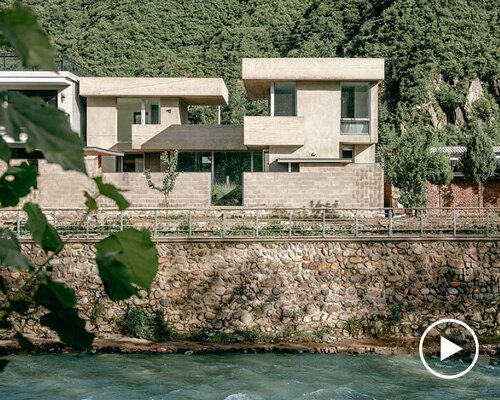Riverside House stands along rural village’s river outside Beijing
Located on the outskirts of Beijing, Xiān Architects’ Riverside House is situated north of a river in a small village setting, surrounded by varied residential typologies including a trout house, a gathering space, and traditional village homes. The 170-square-meter residence was designed to accommodate essential living functions, including three bedrooms, a dining area, and a living room.
Budget constraints informed the use of a vernacular brick–concrete structural system. This approach enabled the creation of continuous, closely spaced vertical walls that ensure direct load transfer between the aligned floors. The house is organized into three vertically stacked volumes: a two-level bedroom cluster to the west, a master bedroom and dining area to the southeast, and a northeast volume comprising a tearoom and a rooftop stargazing platform. This configuration optimizes solar orientation and site-specific sightlines. An elevated terrace connects the living room and tearoom, functioning as both a social space and a visual platform. The arrangement of the three main building masses was calibrated to allow for canopies over neighboring structures while maximizing spatial layering and depth. A cantilevered roof at the top level extends outward, forming a recessed volume that reframes the surrounding landscape as an introspective space.
all images courtesy of Xiān Architects
Riverside House by xiān Architects is embedded in its context
Material selections support the architectural logic: board-formed concrete with exposed wood grain defines structural and spatial elements, while washed stone clads the exterior. These materials were fabricated and assembled using local construction techniques, reflecting the topographical and climatic character of the site. Craftsmanship remains visible in surface treatments and formwork, revealing a tactile dialogue between built form and its natural surroundings. Key architectural gestures, such as the solid concrete masses, integrated parapets, and the cantilevered terrace, emphasize geometric clarity and spatial density. The northeast stargazing platform, defined by three enclosing concrete walls, functions as a formal terminus within the composition and establishes a spatial frame open to the sky. The overall design by Xiān Architects Studio translates environmental forces, light, wind, topography into spatial and material responses. Rather than acting as a scenic object, the house is conceived as a companion to its natural context, reflecting an architecture shaped by rhythm, restraint, and embeddedness within the site.
Riverside House is situated north of a river in a rural village outside Beijing
stacked volumes organize the house into distinct spatial clusters
material choices reflect both functional and environmental considerations
the house is designed to accompany its surroundings rather than dominate them
a vernacular brick-concrete system was chosen for structural efficiency
the cantilevered roof defines a recessed area open to landscape views
spatial layering provides shading and visual depth for adjacent properties
material choices reflect both functional and environmental considerations
project info:
name: Riverside House
architects: Xiān Architects | @xian.architects
lead architects: Wang Yanshi, Bai He
location: Beijing, China
designboom has received this project from our DIY submissions feature, where we welcome our readers to submit their own work for publication. see more project submissions from our readers here.
edited by: christina vergopoulou | designboom
The post riverside house’s geometric concrete volumes by xiān architects pop up in rural beijing appeared first on designboom | architecture & design magazine.

